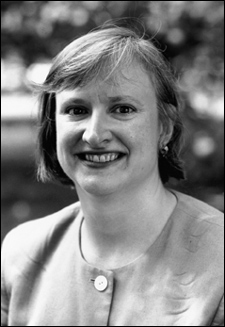Teacher, researcher, advocate – a whole life
Obituary: Kennedy School’s Susan C. Eaton, beloved colleague, tireless activist for social justice, dies at 46

Esteemed Kennedy School faculty member Susan C. Eaton died Dec. 30 of complications from leukemia. She was 46.
Eaton was a tireless advocate for the rights of workers, both as a union organizer and in her teaching and research at the Kennedy School. Her husband and fellow faculty member Marshall Ganz expressed it well: “She was a deeply committed person, a person who walked the walk. She translated her values into action in her teaching, in her research, and in her public life.”
Eaton, an assistant professor of public policy, completed her Ph.D. in industrial relations and organizational studies at the Sloan School of Management at the Massachusetts Institute of Technology. She received her
‘[Susan Eaton] was a person who cared ‹ about social justice, about her work, about her students, about her colleagues. While comfortable with the abstractions of social justice, she applied her concerns every day in the way she treated each of us as individuals.’
– Dean Joseph S. Nye Jr., Kennedy School of Government
master’s degree in public administration from the Kennedy School. Her research focused on challenges faced by low-wage workers, particularly women providing health care, and the role of work organizations, including unions, in addressing these challenges. Last summer, Eaton received a Robert Woods Johnson Award to study the links between quality of work and quality of care in the nursing home industry. Eaton’s writings focused on work-family issues, women’s roles in union leadership, union-management relations, and the role of management in the quality of nursing home care. She was editor of the online Civil Practices Network and contributed to several other industry journals and publications.
Prior to entering academia, Eaton worked for 12 years as a union negotiator, trainer, and manager for the Service Employees International Union (SEIU), AFL-CIO, and CLC.
She joined the Kennedy School faculty in 2000 and became a highly regarded teacher, whose human resources course, “Leading and Managing People Well,” received consistently high marks, exemplifying the leadership model she tried to teach.
“Susan brought a heightened awareness of others to our community in her breadth of research and passionate dedication,” said Kennedy School Dean Joseph S. Nye Jr. “She was a person who cared – about social justice, about her work, about her students, about her colleagues. While comfortable with the abstractions of social justice, she applied her concerns every day in the way she treated each of us as individuals.”
Kennedy School Associate Academic Dean and Director of the School’s Weiner Center for Social Policy Julie Boatright Wilson reflected on the loss of a colleague and a friend.
“Susan was a vibrant presence on the fourth floor of the Taubman building,” said Wilson. “She had time for all of us, was interested in what everyone was
A memorial fund in Susan Eaton’s honor has been established to continue her efforts to link the quality of work to the quality of care in health care, particularly among low-wage women workers. The fund will be managed by The Women’s Union, a tax-exempt 501 (C) 3 organization with a long history of work in this area. Checks may be payable to: The Women’s Union, 356 Boylston St., Boston, MA 02116, earmarked for the Susan C. Eaton Memorial Fund. Donors are asked to include their address on their check or contribution envelope so that they may receive a report on the fund and its activities.
thinking about and working on, and had advice and ideas and wisdom she willingly shared. Even more than what Susan did for us is what she did for the low-wage employees she had spent her life working with and working for. Everything about Susan’s activities – her scholarship, her teaching, her day-to-day interactions – exhibited her commitment to improving the lives of those who provide the services we all need but for which we seem remarkably unwilling to pay a decent wage.”
Eaton’s teaching earned her enormous respect from students while her research brought attention to the issues that touched her heart. “She demonstrated that nursing homes and hospitals could both do better by their workers and improve the quality of care simply with better management practices. Much of her work spoke to the dignity that both caregivers and patients seek and deserve. This readily generalizable lesson seems so terribly important in this increasingly marketized era,” said David Ellwood, Scott M. Black Professor of Political Economy at the Kennedy School.
Eaton was co-winner of the 1996 Margaret Clark award of the Institute of Gerontology for her paper “Beyond Unloving Care: Linking Nursing Home Quality and Working Conditions.” Her other recent writings included: “Career as Life Path” in “Career Frontiers: New Conceptions of Working Lives,” edited by Maury Peiperl et al. (Oxford University Press, 2000); “Work and Life Strategies of Professionals in Biotechnology Firms,” Annals of the American Academy of Science, March 1999; and “Pennsylvania’s Nursing Homes: Promoting Quality Care and Quality Jobs,” Keystone Research Center, April 1997.
In addition to Ganz, Eaton is survived by her father, William J. of Washington, D.C.; her mother, Marilynn, of Alexandria, Va.; and her sister Sally Misare of Castle Rock, Colo.




